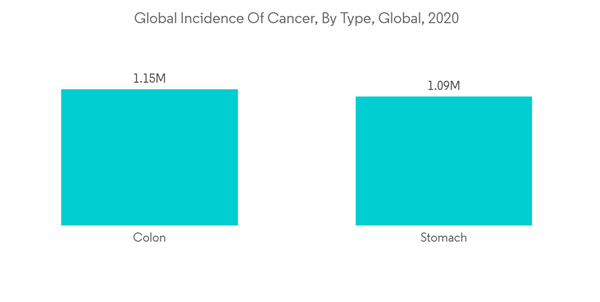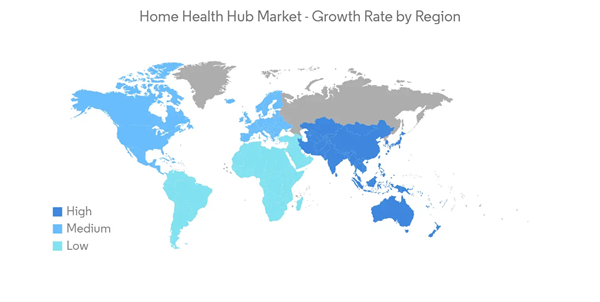Globally, the COVID-19 pandemic put enormous pressure on hospitals and healthcare systems that were understaffed and overworked. Home health hub technology helped patients to remain safe within their homes while reducing stress on hospitals, emergency rooms, and front-line healthcare workers during the pandemic, which shows a positive impact on the market. According to the study titled "COVID-19's impact on home health services, caregivers and patients: lessons from the French experience," published in the Lancet Regional Health in August 2021, Since the start of the Covid-19 pandemic, home-based care has been in high demand to relieve hospital overcrowding and allow patients with chronic diseases or non-severe Covid-19 to be cared for and monitored at home. Thus, the home health hub market was positively impacted by COVID-19.
The Home Health Hub Market is predicted to develop as the number of chronic diseases rises, and the geriatric population grows. Additionally, the expanding use of smartphones, as well as the growing desire to cut healthcare costs, are both driving the market forward. According to the July 2021 update by the World Health Organization, cardiovascular diseases are the leading cause of death around the world, including diseases like coronary heart disease, cerebrovascular disease, rheumatic heart disease, congenital heart disease, and others. As per the same source, in 2019, 17.9 million people around the world died from cardiovascular diseases, which amounted to about 32% of all global deaths. Additionally, The Globocan 2020 report published by Global Cancer Observatory estimated the incidence and mortality of 36 cancer in 185 countries. Globally, there were an estimated 19,292,789 new cases of cancer diagnosed in 2020, and about 9,958,133 people died due to cancer all over the world. Further, as per the same source, the number of new cancer cases is expected to reach 24,044,406 by 2030, which shows an increasing prevalence of cancer around the globe.
The geriatric population is expected to have a significant impact on the market studied as people aged above 65 are more prone to chronic diseases. According to the World Health Organization Facts of 2021, the proportion of the global population aged 60 and up will nearly double from 12% to 22% between 2015 and 2050. By 2050, 80% of the world's elderly will live in low- and middle-income countries. The population is aging at a much faster rate than in the past. Every country faces significant challenges in ensuring that its health and social systems are prepared to take advantage of this demographic shift.
However, various key strategic activities by the market players are anticipated to boost the market over the forecast period. For instance, in March 2022, VEON Ltd., a global provider of connectivity and internet services, announced that it is Banglalink mobile operator in Bangladesh had launched Health Hub, the country's first integrated digital health platform.
Thus, all aforementioned factors are expected to drive the market over the forecast period. However, security and privacy concerns and reimbursement issues are the factors that might restrict the growth of the market.
Home Health Hub Market Trends
Smartphone-based Segment is Expected to Dominate the Market Over the Forecast Period
The growing popularity of digital platform smartphones has fueled the growth of the Smartphone-Based Hubs sector, which now has the largest market share. Mobile programs (Android, iOS, Linux, and Windows) that can be downloaded to dedicated smartphones and tablets are required for smartphone-based hubs. Smartphones and tablets are becoming the primary means of internet connectivity in developed nations, and their use is increasing in developing countries.Increased use of mobile platforms to improve patient information accessibility is being driven by increased smartphone usage and the continuous growth of high-speed mobile networks. Smartphone-enabled home health hubs are expected to rise in popularity as awareness and accessibility grow. A growing preference for smartphone technology and the internet and mounting demand for smartphone-based health hub is expected to boost the market growth. As per Eurostat data, by updates from December 2022, by 2021, the share of EU households with internet access had risen to 92%, some 20 percentage points higher than in 2011 (72%). Moreover, broadband internet access was used by 90% of the households in the EU in 2021, 25 percentage points higher than in 2011 (65%).
Furthermore, product launches by the key market players are anticipated to boost the market over the forecast period. For instance, in March 2022, the GRS India startup launched a new smartphone-based portable oxygen kit that can provide consistent oxygen supply during disasters and medical emergencies.
Thus, all aforementioned factors are expected to boost the market over the forecast period.
North America Dominates the Market and Expected to do Same in the Forecast Period.
Factors such as the high adoption of sophisticated technology, the prevalence of chronic and lifestyle diseases, rising healthcare spending, physician shortages, and increasing demand for better healthcare services are all contributing to North America's big share of the worldwide market. According to the Globocan 2020 report, an estimated 2,281,658 new cancer cases were diagnosed in the United States in 2020, with nearly 612,390 deaths. In 2020, The most common cancers were breast (253,465), lung (227,875), prostate (209,512), and colon (101,809) in the United States.Additionally, the rise in healthcare expenditure and growth in disposable income also drive the market for home health hubs across the globe. According to the PETERSON-KFF Health System Tracker data published in February 2022, the United States health care spending increased 9.7% to reach USD 4.1 trillion in 2020, a much faster rate than the 4.3% increase seen in 2019. The acceleration in 2020 was due to a 36.0% increase in federal expenditures for health care that occurred largely in response to the COVID-19 pandemic. The average annual growth in health spending from 2010-2019 was 4.2%. The largest shares of total health spending were sponsored by the federal government (36.3%) and the households (26.1%). The private business share of health spending accounted for 16.7% of total health care spending, state and local governments accounted for 14.3%, and other private revenues accounted for 6.5%.
Furthermore, according to the study titled "Ensuring Quality Cancer Care through the Oncology Workforce: Sustaining Care in the 21st Century: Workshop Summary," published in the National Library of Medicine in October 2020, the United States faces a potential shortage of more than 1 million nurses by 2020. Thus increasing shortage of healthcare workforce in the country increases the adoption of home health hubs. Thus, all aforementioned factors are anticipated to boost the segment growth over the forecast period.
Home Health Hub Industry Overview
The competitive character is influenced by technical breakthroughs and the quick adoption of new devices for better treatment. Furthermore, as important competitors focus more on global development, strategic collaborations, partnerships, and product releases in the future years, competition amongst them will heat up. Major players include OnKöl, INSUNG INFORMATION CO, LTD., IDEAL LIFE INC., iHealth Labs Inc., Honeywell International Inc., Vivify Health, Inc.Additional Benefits:
- The market estimate (ME) sheet in Excel format
- 3 months of analyst support
This product will be delivered within 2 business days.
Table of Contents
Companies Mentioned (Partial List)
A selection of companies mentioned in this report includes, but is not limited to:
- Honeywell International,
- Lamprey Networks,
- iHealth Lab
- Capsule Technologies Inc.,
- Pfizer Inc.,
- Inhealthcare,
- Qualcomm Technologies, Inc.,
- Encompass Health Corporation,
- OceanWP,
- MyVitalz LLC,
- Koninklijke Philips N.V.,
- HiCare Pvt. Ltd,
- Health Hub Vienna,
- Technologies Inc.,
- Vivify Health, Inc.,
- OnKOI










